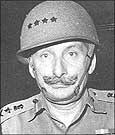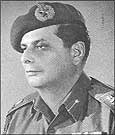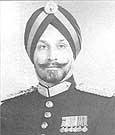At 83, the twinkle in his eye remains undimmed, and his sense of humour shines through.
The man who masterminded the liberation of Bangladesh in 1971 walks down memory lane in an exclusive chat with Deputy Managing Editor Ramananda Sengupta.
The crackdown (by West Pakistan on East Pakistan) took place from the 3rd to 26th of March. The Indian government was very concerned over the large number of refugees that kept coming in.
In the beginning of April, General (S H F J) Manekshaw (below, left), the army chief, called up to say that the government required the army to move into East Pakistan immediately. I told him that was not possible because we had mountain divisions and no bridges, and there were a large number of rivers between us and Dhaka, very wide and unbridged.
The monsoon was about to break, our divisions were not trained in riverine warfare, we had no transport (mountains divisions have very little) and it was not possible for us to move in.
So he said he would come back to me. When he came back the next day, he said they were accusing him and the army of being cowards. So I told him, "You tell them that it's not you, it's the Eastern Command that's not moving."
"When the bloody hell can you move by?" he asked.
"If you give me the bridges and other stores required, and the time for training, not before 15th of November," I replied.
Why?
I said because by the 15th of November the ground would have dried up, and we should be able to move. So that was that. After that Manekshaw went to Mrs Gandhi and the Cabinet and briefed them.
 So we knew a war was coming, and I made a plan to capture East Pakistan. I knew that the Pakistanis would defend the towns, so the main strategy of that plan was that Dhaka was to be our final and principal objective, since it was the geopolitical and geostrategic heart of then East Pakistan.
So we knew a war was coming, and I made a plan to capture East Pakistan. I knew that the Pakistanis would defend the towns, so the main strategy of that plan was that Dhaka was to be our final and principal objective, since it was the geopolitical and geostrategic heart of then East Pakistan.
In each of the other sectors, for instance in the Jessore sector, we selected objectives like communications centres.
So we decided to bypass the towns and use subsidiary tracks and head straight for Dhaka. We never wanted to capture any town, because capturing a town takes a long time. I knew the war would be short, I knew the UN was bound to intervene, so we couldn't spend time capturing towns. You see how much the time Americans took to capture the town of Fallujah in Iraq?
So the strategy was, draw them to border, use subsidiary tracks to bypass the towns and defences, and head for Dhaka from all directions.
Meanwhile, the refugees from East Pakistan were coming in. Tajuddin (the Awami League leader and later Bangladesh's prime minister in exile) and others were set up in Calcutta. I helped them with the initial draft of their declaration of Independence, by giving them a rough draft which they took around and then then suitably enlarged.
So the government orders us to help the Mukti Bahini, camps were set up in the border areas, and they were trained and armed by various agencies.
The Mukti Bahini, and later the East Bengal batallions, had a major role to play in the liberation of Bangladesh. They created the environment in which the Pakistani army was completely demoralised and they couldn't move from one place to another without being attacked. Their contribution was enormous. They attacked the communications and reduced the morale of the Pakistani army, making it much easier for us.
 (General Jacob, left) As for the war plans, I had worked out a strategy when I was a brigade commander and also as GOC (General Officer Commanding) 12th division. I produced a desert warfare book in 1969 in which I laid down these principles. This was later incorporated in the army training manual.
(General Jacob, left) As for the war plans, I had worked out a strategy when I was a brigade commander and also as GOC (General Officer Commanding) 12th division. I produced a desert warfare book in 1969 in which I laid down these principles. This was later incorporated in the army training manual.
The Indian Army was so far used to moving on metalled roads with supplies following it. I said "Nonsense! You move on subsidiary tracks and open a supply route later. Go self contained, bypass. The main roads can be opened later, so you don't have to depend on it for some time."
The main problem was logistics, which was critical in winning that war. So in May 1971, even before we received any orders from anyone, we started building up the logistics in Tripura for one corps, throughout the monsoons, before any orders arrived from Army HQ.
Similarly in Tura and other places, we got the Borders Roads Organisation to make the roads, made hospitals airfields, etc. In May I sent a plan to Army HQ giving Dhaka as a principal objective and allocation of troops. HQ sat on it for some time, and it was only in August that General Manekshaw and his Director of Military Operations K K Singh turned up and gave us the following plans.
The orders, which were issued in writing and never changed, said that we would capture the entry ports of Khulna and Chittagong, and our thrust weighted accordingly. That's all.
I argued that we had to take Dhaka, and I was told no, if we took Khulna and Chittagong the war would be over. I asked how, since Khulna was nothing but a minor river port 30 miles from our border. Chittagong was peripheral. So these arguments went on for some time, and the only change that Manekshaw made was that he removed the word weight.
So the orders we went to war with was to capture Khulna and Chittagong. Dhaka was not mentioned anywhere.
We did not take Khulna, and we did not capture Chittagong, yet we won the war.
I had to find troops for Dhaka. There was 6 Mountain Division which was kept in the north for Bhutan. So I begged for troops from that division, but was told that I was not going to get them, because the Chinese were likely to attack. Manekshaw refused to give me any troops from the north to take Dhaka.
I was given a para batallion group. I planned to drop it at Tangail and I signed the orders for that in October. We laid down in that the drop would take place on D +7, and the link up would be in 24 hours. It occurred exactly as we had planned.
We sent Captain P K Ghosh of 50 Para Brigade in November to Tangail with 'Tiger' Siddiqi, a former Pakistani armyman, to lay out the dropping zone. But I had to find troops. The two divisions that were in Mizoram and Nagaland had no artillery. Therefore I moved all the artillery from the Chinese border to make these divisions up. I also moved down three brigades for the Dhaka thrust. Things were moving.
The Mukti Bahini operations finished on the 30th of November. So I told the army commander, Lieutenant General J S Aurora below left), that this is the plan for Dhaka, and he said he would inform Manekshaw. I said don't inform him, because Manekshaw has said the Chinese are likely to attack, and he doesn't know about this move. And also he does not think Dhaka is important.
The new DMO (Director of Military Operations), Inder Gill, and I got along well, and he helped me in this. But nothing was conveyed to Manekshaw about this until November 30, when Aurora sent him a signal saying that I had moved these brigades down to capture Dhaka.
The answer came in two hours and read like this: "Who told you to move these brigades? You will move them back at once!"
So an agitated Aurora came in asking what do we do, and I told him and that I would take care of it. When I called up Gill, he said: "Why the hell did you have to send that stupid signal? Manekshaw is shouting at me for not telling him about it."
 So I said I hadn't sent that message, and that there's no way I would send those brigades back. We all know the war is going to start, and we all know that if I send them I will never get them back in time.
So I said I hadn't sent that message, and that there's no way I would send those brigades back. We all know the war is going to start, and we all know that if I send them I will never get them back in time.
"Jake," he said, "don't send them back, but please do not commit them into Bangladesh without Army HQ sanction, because the chief is adamant."
"Inder," I replied. "I give you my word."
I never knew that once the war started, Manekshaw would would not allow us to move those brigades into Bangladesh until December 8.
On December 3, Manekshaw rang me up in the evening saying they have bombed our airfields in the west, and I said I take it the war has started. He said yes, you go ahead. Mrs Gandhi, he said, was in Calcutta, so please inform her, and I said okay.
I then told Aurora that the war has started, I have to prepare the orders, so please you go and inform her at Raj Bhavan. So I tied up the air support and issued the orders.
The war had begun.





